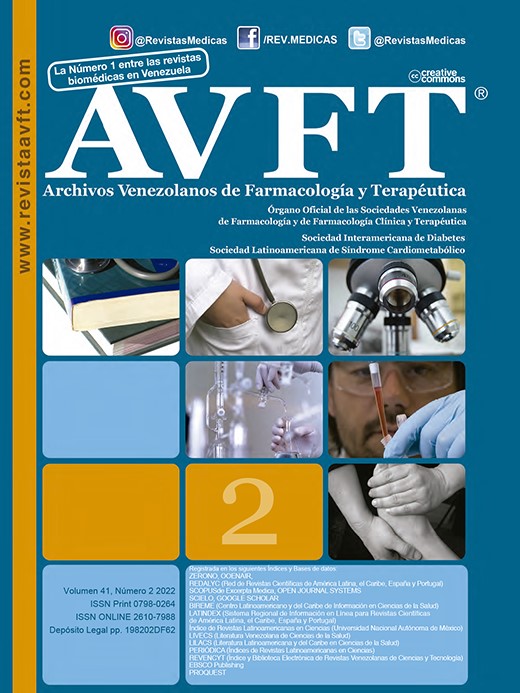Allopurinol modulated serum troponin level in renal stone patients
Keywords:
troponin, allopurinol, xanthine oxidase, cardiac diseasesAbstract
Cardiovascular diseases are aggravated by various factors, including chronic use of certain medications. There are worldwide reported cases of sudden strokes or myocardial infarction in previously non-ischemic patients while using medications for other chronic diseases, such as diabetes, gout, hypertension, and endocrine diseases. The mechanism is quite complicated, and the underlying causes were obscure. In line with this reported toxicity are patients with hyperuricemia on uric acid lowering therapy. The goal of the present investigation was to assess the cardiotoxic effect of allopurinol based on the levels of troponin that were quantified by fully automated COBAS technique in apparently healthy renal stone patients. To do so, serum samples were collected from these patients at baseline (before starting allopurinol therapy), and at the end of the course of the therapy. The troponin level was significantly elevated after allopurinol therapy compared to baseline. The study concluded that allopurinol could have a significant cardiotoxic effect in heart tissues and should be used cautiously in patients with pre-existing ischemic cardiac diseases.
Downloads
References
Hernández-Martínez EA, Santillán-Benítez JG, Sandoval-Cabrera A, Cervantes-Rebolledo C. Uric acid is an independent biomarker in the management of a chronic renal disease. Revista Latinoamericana de Hipertension. 2021 Oct 1;16(4):329-36. doi: 10.5281/zenodo.5812362
Zhang Y, Marcillat O, Giulivi C, Ernster L, Davies KJ. The oxidative inactivation of mitochondrial electron transport chain components and ATPase. J Biol Chem. 1990; 265(27):16330-6.
Ekelund UE, Harrison RW, Shokek O, Thakkar RN, Tunin RS, Senzaki H, et al. Intravenous allopurinol decreases myocardial oxygen consumption and increases mechanical efficiency in dogs with pacing-induced heart failure. Circ Res. 1999; 85(5):437-45. doi: 10.1161/01.res.85.5.437.
Xin W, Mi S, Lin Z. Allopurinol therapy improves vascular endothelial function in subjects at risk for cardiovascular diseases: a meta-analysis of randomized controlled trials. Cardiovasc Ther. 2016; 34(6):441-449. doi: 10.1111/1755-5922.12215.
Singh TP, Skalina T, Nour D, Murali A, Morrison S, Moxon JV, et al. A meta-analysis of the efficacy of allopurinol in reducing the incidence of myocardial infarction following coronary artery bypass grafting. BMC Cardiovasc Disord. 2018;18 (1):143. doi: 10.1186/s12872-018-0881-6.
Rashid MA, William-Olsson G. Influence of allopurinol on cardiac complications in open heart operations. Ann Thorac Surg. 1991; 52(1):127–130. doi: 10.1016/0003-4975(91)91433-V.
Huang Y, Zhang C, Xu Z, Shen J, Zhang X, Du H, et al. Clinical Study on efficacy of allopurinol in patients with acute coronary syndrome and its functional mechanism. Hellenic J Cardiol. 2017;58(5):360-365. doi: 10.1016/j.hjc.2017.01.004.
Noman A, Ang DS, Ogston S, Lang CC, Struthers AD. Effect of high-dose allopurinol on exercise in patients with chronic stable angina: a randomised, placebo controlled crossover trial. Lancet. 2010;375(9732):2161-7. doi: 10.1016/S0140-6736(10)60391-1.
Alemzadeh-Ansari MJ, Hosseini SK, Talasaz AH, Mohammadi M, Tokaldani ML, Jalali A, et al. Effect of High-Dose Allopurinol Pretreatment on Cardiac Biomarkers of Patients Undergoing Elective Percutaneous Coronary Intervention: A Randomized Clinical Trial. Am J Ther. 2017; 24(6):e723-e729. doi: 10.1097/MJT.0000000000000411
Separham A, Ghaffari S, Najafi H, Ghaffari R, Ziaee M, Babaei H. The Impact of Allopurinol on Patients With Acute ST Elevation Myocardial Infarction Undergoing Thrombolytic Therapy. J Cardiovasc Pharmacol. 2016; 68(4):265-268. doi: 10.1097/FJC.0000000000000409.
Berry CE and Hare JM. Xanthine oxidoreductase and cardiovascular disease: Molecular mechanisms and pathophysiological implications. J Physiol. 2004;555(Pt 3):589-606.
Doehner W, Anker SD. Xanthine oxidase inhibition for chronic heart failure: is allopurinol the next therapeutic advance in heart failure? Heart. 2005; 91(6): 707–709. doi: 10.1136/hrt.2004.057190.
Naumova AV, Chacko VP, Ouwerkerk RS, tull L, Marban E, Weiss RG. Xanthine oxidase inhibitors improve energetics and function after infarction in failing mouse hearts. Am J Physiol Heart Circ Physiol. 2006; 290(2):H837-43. doi: 10.1152/ajpheart.00831.2005.
Amado LC, Saliaris AP, Raju SV, Lehrke S, St John M, Xie J, et al. Xanthine oxidase inhibition ameliorates cardiovascular dysfunction in dogs with pacing-induced heart failure. J Mol Cell Cardiol. 2005; 39(3):531-6. doi: 10.1016/j.yjmcc.2005.04.008. PMID: 15963530.
Xiao J, She Q, Wang Y, Luo K, Yin Y, Hu R, et al. Effect of allopurinol on cardiomyocyte apoptosis in rats after myocardial infarction. Eur J Heart Fail. 2009;11(1):20-7. doi: 10.1093/eurjhf/hfn003. PMID: 19147453.
Rekhraj S, Gandy SJ, Szwejkowski BR, Nadir MA, Noman A, Houston JG, et al. High-dose allopurinol reduces left ventricular mass in patients with ischemic heart disease. J Am Coll Cardiol. 2013;61(9):926-32. doi: 10.1016/j.jacc.2012.09.066.
Ullah W, Khanal S, Khan R, Basyal B, Munir S, Minalyan A, et al. Efficacy of Allopurinol in Cardiovascular Diseases: A Systematic Review and Meta-Analysis. Cardiol Res. 2020; 11(4):226-232. doi: 10.14740/cr1066.
Cappola TP, Kass DA, Nelson GS, Berger RD, Rosas GO, Kobeissi ZA, et al. Allopurinol improves myocardial efficiency in patients with idiopathic dilated cardiomyopathy. Circulation. 2001;104(20):2407-11. doi: 10.1161/hc4501.098928.
Dusenova SB, Tukbekova BT, Kizatova ST, Korneyeva EA, Abisheva BI, Kurilova VV, Zhetpisbaewa RE, Sarmankulova G. Early predictors and prognostication of children chronic kidney disease in the conditions of environmental disability. Revista Latinoamericana de Hipertensión. 2019;14(3):356-64.
Downloads
Published
How to Cite
Issue
Section
License
Copyright (c) 2023 AVFT – Archivos Venezolanos de Farmacología y Terapéutica

This work is licensed under a Creative Commons Attribution-NonCommercial-NoDerivatives 4.0 International License.




